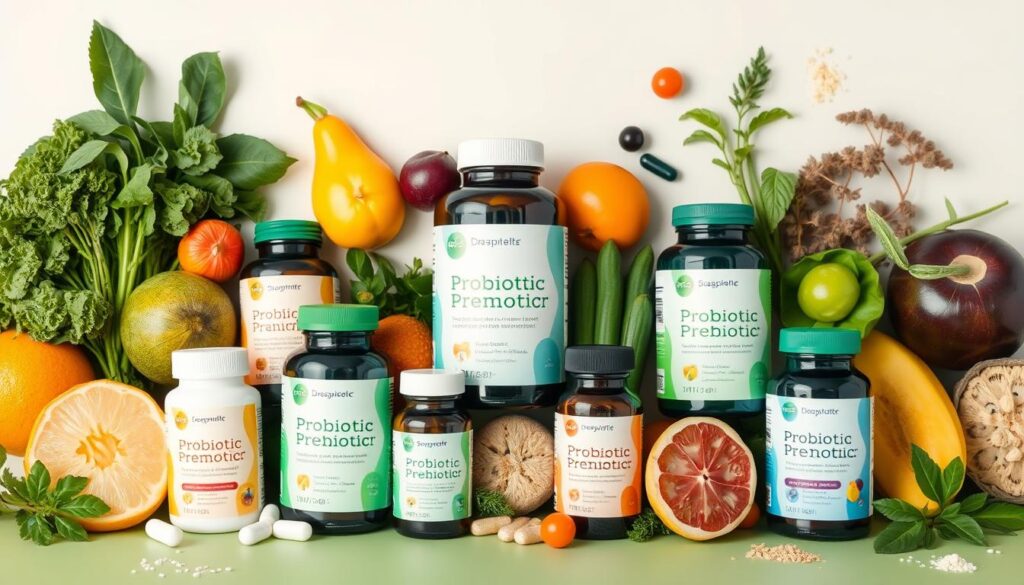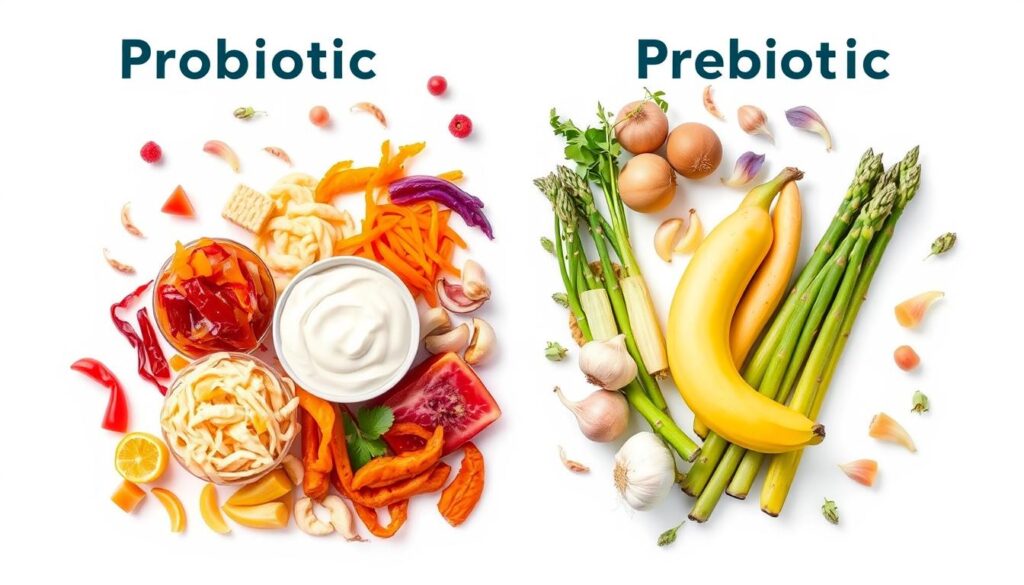Discover the Difference: Probiotics vs Prebiotics
When it comes to gut health, two terms are often mentioned together: probiotics and prebiotics. Understanding the difference between probiotics vs prebiotics is crucial for making informed decisions about your health. Probiotics benefits are well-documented, but what about prebiotics definition and how it contributes to overall wellness? In this article, we will delve into the world of probiotics and prebiotics, exploring their unique roles and importance in maintaining a healthy gut.
Key Takeaways
- Probiotics and prebiotics are two distinct concepts that work together to support gut health.
- Probiotics benefits include supporting digestive health and boosting the immune system.
- Prebiotics definition refers to non-digestible fibers that serve as food for beneficial bacteria.
- Understanding the difference between probiotics vs prebiotics is essential for creating a balanced gut health strategy.
- Incorporating both probiotics and prebiotics into your diet can have a significant impact on overall wellness.
- A healthy gut microbiome is linked to various aspects of health, including digestive health, immune function, and even mental well-being.
Understanding the Basics of Gut Health
Gut health is a vital aspect of our overall wellness, and it’s essential to understand the basics of how it works. The digestive system is home to trillions of microorganisms, including healthy bacteria that play a crucial role in our digestive system support. When it comes to maintaining a healthy gut, it’s not just about taking gut health supplements, but also about creating an environment that allows these beneficial bacteria to thrive.
A healthy bacteria comparison can help us understand the importance of having a balanced gut microbiome. The gut microbiome is made up of different species of bacteria, each with its unique functions and benefits. Some bacteria help with digestion, while others produce vitamins or regulate the immune system. By understanding the role of microorganisms in digestion, we can take steps to support our gut health and overall wellness.

So, why does gut health matter? A healthy gut is essential for proper nutrient absorption, immune system function, and even mental health. An imbalance of the gut microbiome, also known as dysbiosis, has been linked to various health conditions, including digestive disorders, autoimmune diseases, and mental health issues. By incorporating gut health supplements and making dietary changes to support our digestive system support, we can promote a healthy balance of bacteria in our gut.
The Role of Microorganisms in Digestion
Microorganisms in the gut play a vital role in breaking down complex foods, absorbing nutrients, and regulating the immune system. They also produce certain vitamins, such as vitamin K and biotin, and help to maintain the integrity of the gut lining.
Why Gut Health Matters for Overall Wellness
Gut health is closely linked to our overall wellness, and an imbalance of the gut microbiome can have far-reaching consequences. By prioritizing gut health and taking steps to support our digestive system support, we can reduce the risk of chronic diseases and promote overall health and well-being.
Introduction to Beneficial Bacteria
Beneficial bacteria, such as Lactobacillus and Bifidobacterium, are essential for a healthy gut. These bacteria help to break down complex foods, regulate the immune system, and produce certain vitamins. By incorporating foods rich in beneficial bacteria, such as yogurt and kefir, and taking gut health supplements, we can support the growth of these beneficial bacteria and promote a healthy gut.
Probiotics vs Prebiotics – What’s the Difference?
When it comes to maintaining a healthy gut, two terms are often mentioned: probiotics and prebiotics. While they are related, they have distinct roles in supporting digestive health. Probiotics are live microorganisms that provide probiotics benefits such as improving digestion and boosting the immune system. On the other hand, prebiotics are non-digestible fibers that serve as food for beneficial bacteria, helping them thrive in the gut.
To understand the difference between probiotics vs prebiotics, it’s essential to know the prebiotics definition. Prebiotics are typically found in foods such as asparagus, bananas, and onions, and can also be taken as supplements. They help create a favorable environment for probiotics to grow, allowing them to provide their benefits more effectively.

Here are some key points to consider when it comes to probiotics vs prebiotics:
- Probiotics are live microorganisms that provide various health benefits.
- Prebiotics are non-digestible fibers that serve as food for beneficial bacteria.
- Both probiotics and prebiotics are essential for maintaining a healthy gut.
In conclusion, understanding the difference between probiotics vs prebiotics is crucial for making informed decisions about gut health. By incorporating both into your diet, you can support the growth of beneficial bacteria and enjoy the probiotics benefits they provide.
| Term | Definition |
|---|---|
| Probiotics | Live microorganisms that provide health benefits |
| Prebiotics | Non-digestible fibers that serve as food for beneficial bacteria |
The Science Behind Probiotics
Probiotics are live microorganisms that provide numerous health benefits when consumed, particularly in regards to probiotics benefits and the comparison with prebiotics in a healthy bacteria comparison. They are often referred to as “good” or “friendly” bacteria because they help maintain a healthy gut microbiome. The science behind probiotics is complex, but understanding how they work can help individuals make informed decisions about their use.
There are many different types of probiotic strains, each with its own unique characteristics and benefits. Some of the most common strains include Lactobacillus and Bifidobacterium. These strains can be found in various food sources, such as yogurt and fermented vegetables, or taken as supplements. When considering probiotics vs prebiotics, it’s essential to understand that both play a crucial role in maintaining a balanced gut microbiome.
Types of Probiotic Strains
- Lactobacillus: found in yogurt and other fermented dairy products
- Bifidobacterium: found in fermented vegetables and whole grains
- Streptococcus: found in fermented foods and supplements
Probiotics work by colonizing the gut with beneficial bacteria, which helps to crowd out pathogenic bacteria and promote a healthy balance of microorganisms. This can lead to various health benefits, including improved digestion, boosted immune function, and even mental health support. The benefits of probiotics can be enhanced when combined with prebiotics, as they work together to create a balanced gut microbiome.

Natural Sources of Probiotics
Natural sources of probiotics include fermented foods, such as kimchi, sauerkraut, and kefir. These foods contain live cultures of beneficial bacteria that can help support gut health. Incorporating these foods into one’s diet can provide numerous probiotics benefits and support a healthy bacteria comparison.
| Food Source | Probiotic Strain |
|---|---|
| Yogurt | Lactobacillus |
| Kimchi | Bifidobacterium |
| Sauerkraut | Streptococcus |
Exploring Prebiotics: The Fuel for Good Bacteria
Prebiotics are non-digestible fibers that serve as food for beneficial bacteria in the gut, promoting a healthy digestive system support. Understanding the prebiotics definition is crucial in appreciating their role in maintaining gut health. By fueling good bacteria, prebiotics help create a balanced gut microbiome, which is essential for overall wellness.
When it comes to gut health supplements, prebiotics are often overlooked in favor of probiotics. However, prebiotics play a vital role in supporting the growth of beneficial bacteria, making them an essential component of a comprehensive gut health strategy. A well-balanced diet that includes prebiotic-rich foods, such as asparagus, bananas, and onions, can provide the necessary fuel for good bacteria to thrive.

- Supporting the growth of beneficial bacteria
- Enhancing digestive system support
- Boosting the immune system
- Promoting the production of short-chain fatty acids, which provide energy to the cells lining the colon
Incorporating prebiotics into your diet can be simple. Start by adding prebiotic-rich foods to your meals, and consider supplementing with a high-quality gut health supplement that contains prebiotics. By doing so, you can support the health of your gut microbiome and promote overall wellness.
| Food | Prebiotic Content |
|---|---|
| Asparagus | 2-3 grams per 100 grams |
| Bananas | 1-2 grams per 100 grams |
| Onions | 1-2 grams per 100 grams |
Key Benefits of Including Both in Your Diet
When it comes to maintaining a healthy gut, incorporating both probiotics and prebiotics into your diet can have a significant impact. Probiotics benefits include improving digestive health, boosting the immune system, and even supporting mental well-being. A clear understanding of prebiotics definition is also essential, as they play a crucial role in feeding the good bacteria in your gut, promoting a balanced microbiome balance.
Some of the key advantages of combining probiotics and prebiotics in your diet include:
- Improved digestion and reduced symptoms of irritable bowel syndrome
- Enhanced immune system function, leading to fewer illnesses and infections
- Promotion of a healthy mental state, with reduced stress and anxiety
By understanding the importance of probiotics benefits and prebiotics definition, you can take the first step towards achieving a balanced microbiome balance. This, in turn, can have a positive impact on your overall health and well-being, from digestive health improvements to immune system support and even mental health connection.
As you consider incorporating both probiotics and prebiotics into your diet, remember that a balanced approach is key. By combining these two essential components, you can unlock the full potential of a healthy gut and reap the rewards of a balanced microbiome balance.
How to Choose the Right Supplements
When it comes to selecting gut health supplements, it’s essential to consider the quality indicators to look for in probiotics vs prebiotics. A healthy bacteria comparison can help you make an informed decision. Look for supplements that have a clear label indicating the type and amount of probiotic strains or prebiotic fibers.
Some key factors to consider when choosing supplements include the manufacturer’s reputation, third-party testing, and the presence of additional ingredients that support gut health. It’s also crucial to check the expiration date and storage instructions to ensure the potency and effectiveness of the supplement.
Quality Indicators to Look For
- CFU (Colony-Forming Units) count: Ensure the supplement has a sufficient amount of live bacteria.
- Strain specificity: Choose supplements with specific strains that target your health needs.
- Prebiotic fiber content: Opt for supplements with a blend of prebiotic fibers to support the growth of beneficial bacteria.
Recommended Dosages
The recommended dosage of probiotics vs prebiotics varies depending on the individual’s health needs and the specific supplement. Generally, a daily dose of 1-10 billion CFU is considered effective for probiotics, while prebiotic fibers can range from 2-10 grams per day.
| Supplement Type | Recommended Dosage |
|---|---|
| Probiotics | 1-10 billion CFU per day |
| Prebiotics | 2-10 grams per day |
By considering these factors and choosing a high-quality supplement, you can support your gut health and overall well-being with the right combination of probiotics and prebiotics.
Potential Side Effects and Considerations
When considering probiotics benefits and prebiotics definition, it’s essential to understand the potential side effects and considerations of incorporating these supplements into your diet. While generally safe, some individuals may experience digestive system support issues, such as bloating or gas, when first starting a probiotic or prebiotic regimen.
Some key considerations include:
- Starting with a low dose to assess tolerance
- Choosing a high-quality supplement from a reputable brand
- Consulting with a healthcare professional, especially for individuals with underlying health conditions
By being aware of these potential side effects and taking steps to mitigate them, individuals can maximize the probiotics benefits and prebiotics definition, supporting their overall digestive system support and well-being.
It’s crucial to remember that while probiotics and prebiotics can offer numerous health benefits, they should be used responsibly and under the guidance of a healthcare professional if necessary.
| Supplement | Potential Side Effects | Considerations |
|---|---|---|
| Probiotics | Bloating, gas | Start with a low dose, choose a reputable brand |
| Prebiotics | Digestive discomfort | Gradually increase intake, consult with a healthcare professional |
Incorporating Probiotics and Prebiotics Into Your Daily Routine
To experience the fermented food advantages and maintain a healthy microbiome balance, it’s essential to incorporate probiotics and prebiotics into your daily routine. This can be achieved by making a few simple changes to your diet and lifestyle.
One way to start is by planning your meals around gut health supplements and fermented foods. You can try adding probiotic-rich foods like yogurt or kefir to your breakfast, or snacking on prebiotic-rich fruits and vegetables throughout the day.
Meal Planning Tips
- Include a variety of fermented foods in your diet, such as sauerkraut, kimchi, and kombucha.
- Choose whole, unprocessed foods as much as possible to support a healthy microbiome balance.
- Consider taking gut health supplements if you’re having trouble getting enough probiotics and prebiotics from your diet.
By following these tips and making a few simple changes to your daily routine, you can experience the benefits of a balanced microbiome and support your overall health and wellbeing.
Conclusion: Building a Balanced Gut Health Strategy
As we’ve explored, maintaining a healthy gut is essential for overall well-being. By understanding the intricate relationship between probiotics and prebiotics, we can create a balanced approach to supporting our gut microbiome. Incorporating a variety of probiotic-rich foods and prebiotic-containing fibers into our daily routines can provide a powerful boost to our digestive and immune systems.
Remember, a healthy gut is the foundation for a thriving body and mind. By making mindful choices to nourish our gut, we can unlock a world of probiotics benefits, from improved digestion to enhanced mental clarity. So, let’s embrace the power of prebiotics definition and probiotics, and embark on a journey towards a happier, healthier you.
FAQ
What is the difference between probiotics and prebiotics?
Probiotics are live beneficial bacteria and yeasts that are good for your digestive system. They can help restore the natural balance of gut bacteria. Prebiotics, on the other hand, are types of dietary fiber that feed the good bacteria in your gut, helping them to grow and thrive.
What are the benefits of probiotics?
Probiotics offer a wide range of benefits, including improved digestion, enhanced immune function, and even potential mental health benefits. They can help restore the natural balance of gut bacteria, which is essential for overall health and wellness.
How do I know if I need to take a probiotic supplement?
If you’re experiencing digestive issues, such as bloating, gas, or irregular bowel movements, a probiotic supplement may be helpful. Probiotics can also be beneficial if you’ve recently taken antibiotics, which can disrupt the gut microbiome. Consulting with a healthcare professional can help determine if a probiotic supplement is right for you.
What are some natural sources of probiotics?
Fermented foods, such as yogurt, kefir, sauerkraut, and kimchi, are excellent natural sources of probiotics. These foods contain live, beneficial bacteria that can help support a healthy gut microbiome.
What are the benefits of including prebiotics in my diet?
Prebiotics act as food for the good bacteria in your gut, helping them to grow and thrive. This can lead to improved digestion, better nutrient absorption, and a stronger immune system. Incorporating prebiotic-rich foods, such as onions, garlic, and whole grains, can be a great way to support your gut health.
How do I choose a quality probiotic or prebiotic supplement?
When selecting a probiotic or prebiotic supplement, look for products that contain high-quality, well-researched strains of bacteria or fibers. Check the label for the number of live cultures and the specific strains included. It’s also important to consider the dosage and any additional ingredients or fillers in the supplement.
Are there any potential side effects of taking probiotics or prebiotics?
In general, probiotics and prebiotics are considered safe for most people. However, some individuals may experience mild side effects, such as gas, bloating, or changes in bowel movements, especially when first starting a supplement. It’s important to start with a lower dose and gradually increase, and to consult with a healthcare professional if you have any concerns.




